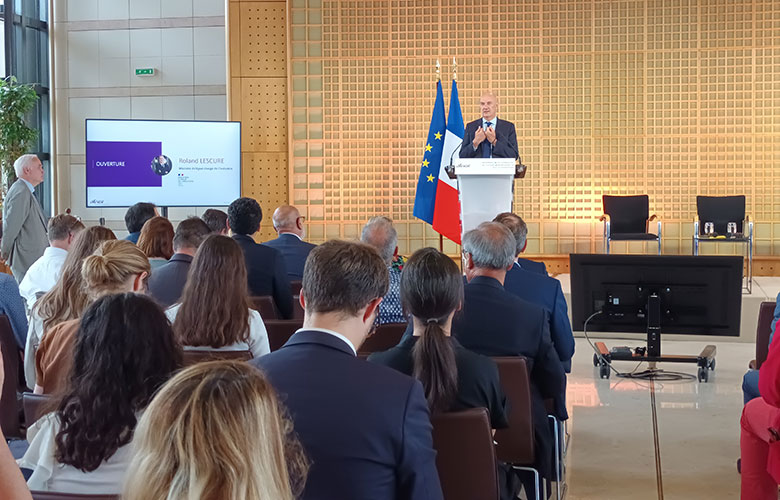Green industry: six months to build the Triple E

A maquis, a magma, a forest… The words of Industry Minister Roland Lescure, who came to launch the work on the “Triple E” standard on Thursday July 20, 2023 at Bercy, gave an idea of the confusion that reigns in the French economic landscape between standards, labels, indicators, certifications… Companies can have the impression of piling up “green” titles of glory and investing a lot for a return on investment that ultimately remains opaque. Not to mention the planet, which pays a high price for this cacophony.
So, to clear the way and enable French manufacturers to take the environmental turn, without ignoring existing commitment to ecological progress approaches that speak to everyone, such as the famous ISO 14001, the French government has entrusted AFNOR with the task of developing the Triple E standard, an ” umbrella” that will provide both ” clarity and excellence “, according to Roland Lescure. This request is being made as part of the Green Industry Bill, spearheaded by Economy and Finance Minister Bruno Le Maire, with a deliverable expected sometime in 2024. The environmental transition is no longer a constraint, but an opportunity for companies to retain their talent, their investors and their competitiveness,” added Roland Lescure. Triple E will give us direction. And this umbrella, [qui sera au départ] blue-white-red, will soon become European. “
Triple E: SMEs and ETIs welcome to the standardization table
The Triple E reference system will list the criteria enabling manufacturers to claim European environmental excellence and apply for the associated mark of recognition (label or certification).
This is where voluntary standardization comes into play: what better way than through the standards engineering of AFNOR, with its 21,000 professionals involved in standardization committees, to produce these standards? We’re talking about voluntary standards here, as these documents list best practices and should be distinguished from regulations, which are mandatory.
The work will have to be efficient and compact: the aim is to get Triple E out within six months. To achieve this, there are no secrets: you have to federate. Bring together manufacturers and federations of all sizes, sectors and maturity levels.
Marie Bonnet-Jacqui, Inspector at the French General Inspectorate for the Environment and Sustainable Development (IGEDD), has agreed to chair the new AFNOR commission. Aware that she was tackling a titanic project, she reminded us that nothing is more complicated than keeping things simple. “Particularly when you start with a very dense existing network. But Triple E will be a label for manufacturers. It will not focus on products, but on processes. It will provide a guarantee for public and private purchasers, who will be assured of the environmental excellence of their suppliers. To the small and medium-sized businesses, I say don’t let the presence of the big firms and groups intimidate you. Come along; I’ll make sure that the balance is respected”, she said at the meeting on July 20. You can contact us here (requires a Norminfo account).
Triple E: a grid of equivalence with existing standards
The content of the reference system will necessarily refer to carbon. On this point, Bruno Millienne, MP for Yvelines, who supported the project during the pre-parliamentary shuttle consultation, pointed out that France has the most carbon-free energy mix in Europe, along with Sweden and Finland. “We’re in the lead, but we don’t make the most of this position. Triple E will give us the opportunity to collect the best of the standards, to explore some thirty existing texts and to group them together under a standard which, in the medium term, should appeal to the other countries of the European Union.” And, above all, to become a marker of choice to signal an ecological effort, in the direction of financial backers eager to green their investments, and in the direction of public purchasers encouraged to buy ecologically, locally, circularly and decarbonized.
Franck Lebeugle, Director of AFNOR’s standardization activities, reminded the audience that the project should be conceived as an “umbrella standard” covering the issues addressed by existing, internationally recognized voluntary standards, such as ISO 14001 on environmental management, ISO 50001 on energy management, or others on life cycle, greenhouse gas emissions, theeconomy-circular-mode or the biodiversity. Added to this is a “made in France” angle, which should make Triple E a guarantee of territorial attractiveness for local authorities hosting companies committed to this approach to excellence. “This standard will operate on the basis of eco-equivalence with existing environmental schemes: players who already hold one of the corresponding certifications can be recognized as “Triple E” by verifying this equivalence.“explains Lina Ismail, who is coordinating the project for AFNOR.
The next meetings of this new commission are scheduled for August 29, September 12, September 28 and October 10, 2023. Do you work in the manufacturing or extractive industries? As a player in the banking sector, are you involved in financing companies committed to ecological transition? Are you a strategy director or sustainable development manager? It’s up to you to write the standard!